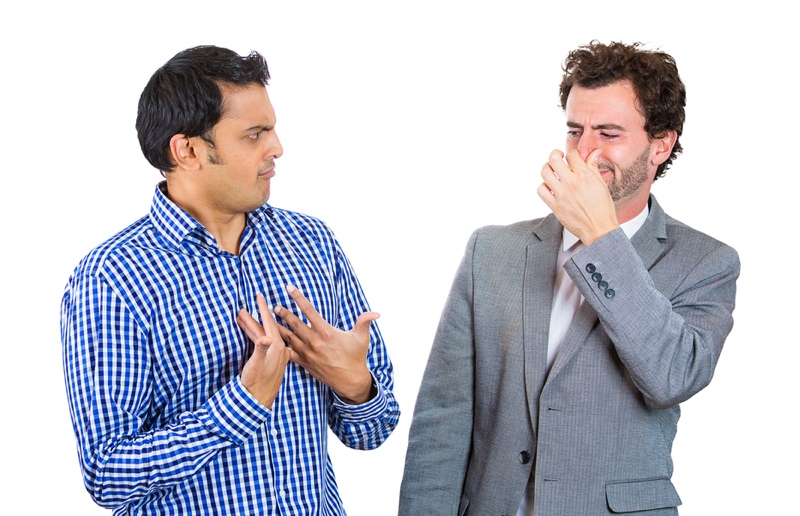Your Politics Stink: People Can Literally Smell Ideology

Your politics may, quite literally, stink — at least to those who don't share such beliefs.
A new study finds that people prefer the scents of those who share their political attitudes, even though they aren't able to match a particular smell to a particular voting pattern. This small, subconscious preference could explain why people gravitate toward mates whose politics mesh with theirs — perhaps compatibility has a smell.
"There is something about someone who is politically similar to you that is being put out there and you're receiving that, and that might just slightly change your position," said study researcher Pete Hatemi, a political scientist at Pennsylvania State University. "It might make you a little more interested. It might make you just interested enough to stick around." [Top 10 Mysteries of the Mind]
The smell of politics
Hatemi and his colleagues knew that a great deal of research has shown that spouses tend to match each other's political views more so than any other trait beside religion. A longer relationship does not lead to greater convergence in views, suggesting this matching occurs because people pick someone politically similar to them in the first place. But Hatemi and his colleagues have found that people tend to avoid trumpeting their politics when angling for dates, suggesting political attitudes don't contribute much to first impressions.
It's possible that the tendency for people to seek out mates who are like them could cause people to choose partners with similar political preferences. But Hatemi and his colleagues wanted to go deeper. Another line of research has found that political attitudes, rooted as they are in personality and basic beliefs, have a biological component. Conservatives, for example, have stronger disgust reactions than liberals, and some early brain-scan data hints that the two sides of the spectrum process risk and fear differently. What's more, humans may rely more on smell than they realize when picking a mate, according to studies that find, for example, people are more attracted to the smell of those whose immune systems are compatible with their own.
Odor and ideology
Get the world’s most fascinating discoveries delivered straight to your inbox.
To see if smell might also offer clues about a person's basic attitudes, Hatemi's team recruited 146 volunteers, ages 18 to 40, from a university and the surrounding city, and asked them about their political beliefs.
The researchers asked 21 of these volunteers, all of whom identified as strongly liberal or strongly conservative, to wear gauze pads taped under their armpits for 24 hours straight. To prevent odorous contamination, the participants couldn't shower, wear perfumes or deodorant, or even sleep in the same bed with another person during this period, among other rules.
Next, 125 other volunteers were asked to take a whiff of these pads, without knowing who they came from. These volunteers rated the appeal of the smells on a five-point scale and guessed the ideology of the person whose sweat it was.
The smells didn't give conscious clues to ideology — people were unable to correctly guess whether they were smelling sweat from a conservative or liberal. However, their preferences had an ideological bent.
"Conservatives liked the smell of conservatives, and liberals don't like the smell of conservatives," Hatemi said. Conservatives were neutral about the smell of liberals, and liberals were neutral about the smell of other liberals as well, the researchers found.
The researchers controlled for demographic factors, but the effect was small, Hatemi emphasized, and will need to be replicated with other participants before the results should be taken as certain. Statistically speaking, the findings were less than 10 percent likely to be by chance alone.
Even if the smell preference holds, it's unclear how much it matters for real-life dating and mating choices, Hatemi said. If a spritz of cologne or a shower could erase the whole odor, for example, then it's unlikely to be very important. [6 Scientific Tips for a Successful Marriage]
Moreover, the findings should not be taken as an argument thatculture and society don't shape politics or love, Hatemi said, but rather that subtle, innate influences might play a small role.
"It's not necessarily that it's operating overwhelmingly on people," he told Live Science. "It's just kind of there in the background, maybe slightly influencing them."
There could be good reason for romantic chemistry to take ideology into account, said study researcher Rose McDermott, a professor of international relations at Brown University.
"I suspect that, ultimately, it relates to the fact that people who align politically are more likely to stay together long enough to raise their kids successfully to reproductive age, on average, and to garner the social support necessary to do so, because people like to be around them more on average because they are not fighting all the time," McDermott told Live Science.
The researchers reported their findings online Sept. 2 in the American Journal of Political Science.
Follow Stephanie Pappas on Twitter and Google+. Follow us @livescience, Facebook & Google+. Original article on Live Science.

Stephanie Pappas is a contributing writer for Live Science, covering topics ranging from geoscience to archaeology to the human brain and behavior. She was previously a senior writer for Live Science but is now a freelancer based in Denver, Colorado, and regularly contributes to Scientific American and The Monitor, the monthly magazine of the American Psychological Association. Stephanie received a bachelor's degree in psychology from the University of South Carolina and a graduate certificate in science communication from the University of California, Santa Cruz.


